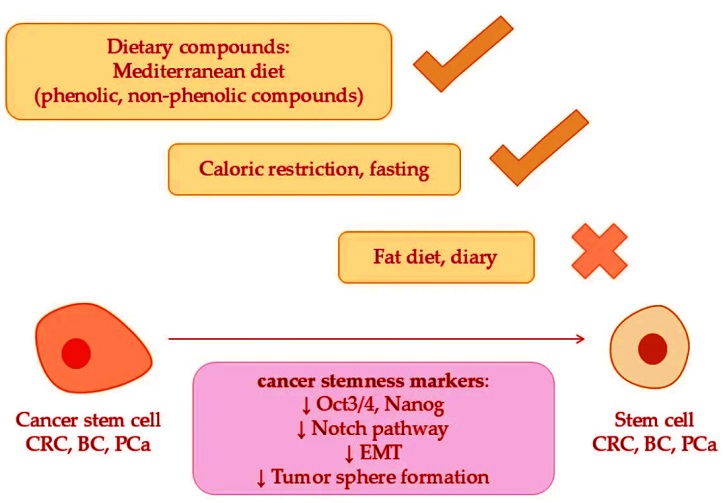Nikhil Prasad Fact checked by:Thailand Medical News Team Jan 15, 2025 3 months, 3 weeks, 4 days, 7 hours, 7 minutes ago
Medical News: Cancer stem cells (CSCs) have been recognized as a key player in the complexities of cancer. These cells, which are undifferentiated and possess the ability to self-renew, are thought to be the driving force behind tumor recurrence, metastasis, and drug resistance. Researchers from the "Carol Davila" University of Medicine and Pharmacy in Bucharest, the University of Bucharest, and the Oncology Institute in Cluj-Napoca, Romania, have conducted an in-depth review on how dietary compounds influence CSCs, particularly in colorectal, breast, and prostate cancers. This
Medical News report sheds light on their findings.
 Graphical Abstract: Dietary Compounds and Their Role in Battling Cancer Stem Cells
Cancer Stem Cells and Their Traits
Graphical Abstract: Dietary Compounds and Their Role in Battling Cancer Stem Cells
Cancer Stem Cells and Their Traits
CSCs share many characteristics with normal stem cells, including the ability to differentiate and adapt to environmental changes. However, CSCs also exhibit a unique resistance to traditional cancer treatments, such as chemotherapy and radiotherapy. This resilience is largely due to their quiescent state, which allows them to evade therapies targeting rapidly dividing cells. Understanding the molecular mechanisms that regulate CSC behavior is crucial to developing new therapeutic strategies.
The Influence of Diet on Cancer Stem Cells
Lifestyle factors, particularly diet, have long been linked to cancer prevention and progression. Studies have shown that dietary bioactive compounds - naturally occurring chemicals in foods - can significantly impact the behavior of CSCs. This review focuses on phenolic and non-phenolic compounds found in foods and their mechanisms of action against CSCs. Researchers have identified several signaling pathways that dietary compounds can influence, including PI3K/Akt/mTOR, Notch, Hedgehog, and Wnt/β-catenin.
Phenolic Compounds and Their Mechanisms
Phenolic compounds, widely present in fruits, vegetables, and tea, have been highlighted for their anticancer properties. These compounds include flavonoids, stilbenes, and lignans, each with unique mechanisms for targeting CSCs.
-Flavonoids: Found in a variety of plants, flavonoids such as quercetin and luteolin inhibit CSC proliferation by targeting pathways like Wnt/β-catenin and Notch. For example, quercetin suppresses breast CSCs by reducing the expression of stemness-related genes and enhancing apoptosis.
-Stilbenes: Resveratrol, a stilbene found in grapes and red wine, has been shown to downregulate key CSC markers and signaling pathways. It also promotes autophagy and apoptosis, reducing the ability of CSCs to form tumors.
-Lignans: Derived from seeds and whole grains, lignans modulate CSC behavior by inhibiting pathways such as NF-κB and PI3K/Akt, reducing tumor aggressiveness and enhancing treatment efficacy.
Non-Phenolic Compounds and Their Benefits
In
addition to phenolic compounds, non-phenolic bioactive compounds also exhibit significant anticancer properties. These include carotenoids, omega-3 fatty acids, and terpenes.
-Carotenoids: Lycopene, a carotenoid found in tomatoes, reduces the expression of CSC markers in prostate cancer. Its antioxidant properties also combat oxidative stress within the tumor microenvironment.
-Omega-3 Fatty Acids: Found in fish oils, omega-3 fatty acids have anti-inflammatory effects that can suppress CSC activity and enhance the efficacy of conventional therapies.
-Terpenes: Compounds like curcumin from turmeric exhibit potent anticancer properties. Curcumin targets CSCs by inhibiting EMT (epithelial-mesenchymal transition) and enhancing apoptosis through the activation of caspases.
Study Findings and Key Mechanisms
The researchers systematically reviewed the molecular interactions between dietary compounds and CSCs in colorectal, breast, and prostate cancers. Here are some highlights:
-Colorectal Cancer: Phenolic compounds like catechin and epigallocatechin gallate (EGCG) from green tea were shown to inhibit the Wnt/β-catenin pathway, reducing CSC proliferation and tumor growth.
-
Breast Cancer: Compounds like resveratrol and curcumin were effective in downregulating stemness markers such as CD44 and ALDH1. These compounds also suppressed EMT, a critical process for metastasis.
-Prostate Cancer: Dietary compounds such as lycopene and genistein inhibited the Hedgehog and PI3K/Akt pathways, reducing CSC survival and enhancing sensitivity to chemotherapeutic agents.
The study emphasizes the importance of dietary bioactive compounds as adjunct therapies in cancer treatment. By targeting CSCs, these compounds may help overcome resistance to conventional therapies and reduce the likelihood of relapse.
Conclusions
The findings of this study underscore the potential of dietary bioactive compounds to influence cancer progression by targeting CSCs. By modulating key signaling pathways and reducing the stemness of these cells, dietary compounds can serve as complementary strategies alongside traditional treatments. For instance, incorporating foods rich in polyphenols, carotenoids, and omega-3 fatty acids into the diet may offer protective benefits against cancer.
The implications of these findings are profound. They not only highlight the role of nutrition in cancer prevention but also open new avenues for research into dietary-based therapies. Understanding the molecular interactions between food compounds and CSCs can pave the way for personalized dietary recommendations aimed at cancer management.
The study findings were published in the peer-reviewed International Journal of Molecular Sciences.
https://www.mdpi.com/1422-0067/26/2/631
For the latest Cancer News, keep on logging to Thailand
Medical News.
Read Also:
https://www.thailandmedical.news/news/researchers-from-university-of-houston-discover-biomarker-for-cancer-stem-cells
https://www.thailandmedical.news/news/new-non-toxic-drug:-svc112,-derived-from-flowers-of-bouvardia-ternifolia-plant-targets-cancer-stem-cells-and-prevents-metastasis
https://www.thailandmedical.news/news/covid-19-news-study-finds-that-doublecortin-like-kinase-1-dclk1,-a-protein-associated-with-cancer-stem-cells,-plays-a-role-in-sars-cov-2-pathogenesis
